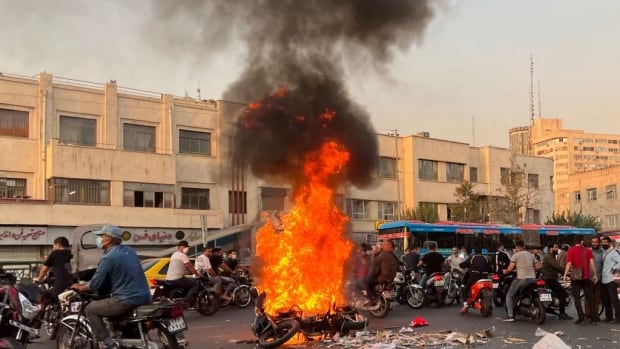Public Safety Minister Marco Mendicino says he believes Canada will be able to designate a list of thousands of members of the Iranian regime who will be inadmissible to Canada within a matter of weeks.
The federal government has levied sanctions against some Iranian individuals and entities in response to a crackdown on protests by Iranian authorities, but it has taken longer to identify the thousands of people who would be affected by this country’s use of measures under the Immigration and Refugee Protection Act (IRPA).
Prime Minister Justin Trudeau said the measures would affect 50 per cent of the Islamic Revolutionary Guard Corps (IRGC).
In an interview on Rosemary Barton Live on Sunday, Mendicino said he was confident the designations could be made in the short term.
“Certainly not years or months. I think we’re looking at weeks,” he told CBC chief political correspondent Rosemary Barton.
Rosemary Barton Live speaks with Minister of Public Safety Marco Mendicino on the federal government’s sanctions against Iranian officials. The sanctions are Ottawa’s latest move in response to the Iranian government’s crackdown on anti-regime protests happening across the country. ‘Those who are most responsible will never be able to set foot in Canada again, or use this country as a safe haven,’ said Mendicino.
Mendicino also responded to news from Iran of a fire at Tehran’s Evin prison, which holds many of the regime’s political prisoners. According to Iranian state media, four people died in the blaze.
The images of the fire are “shocking, to say the least,” Mendicino said.
“There’s no way to convey how serious and how grave the situation is there. So we’re going to march with them, we’re going to stand with them and we’re going to do everything that we can to defend their human rights.”
The Liberal government has been under intense pressure — from the Iranian diaspora in Canada, from opposition MPs and from members of its own caucus — to take substantive action on Iran following the Sept. 16 death in police custody of 22-year-old Mahsa Amini, who was arrested for not adequately covering her hair.
Ongoing protests in Iran have been met with a brutal crackdown, with hundreds of people killed by security forces, human rights groups estimate.
Conservative MPs have been particularly strident in calling for more aggressive action from the federal government. Speaking on CBC’s Power & Politics in late September, Conservative deputy leader Melissa Lantsman said her party supported calls for regime change in Iran.
Boosting sanctions enforcement
On Sunday, a group of human rights organizations, including the families of the victims of Flight PS752, called for G7 countries to expel Iranian representatives from their countries. The Ukrainian commercial plane was shot down by Iranian forces in January 2020, killing all 176 people onboard, including 55 Canadians and 30 permanent residents.
Mendicino emphasized that the IRPA provisions were just one part of the federal government’s response, which also includes more money to build up sanctions enforcement capacity.
“We’re looking at all of the available authorities to make sure that Canada cannot be a backyard for in any way perpetrating or supporting the violations which are going on in Iran,” he told Barton.
While some advocates have criticized Ottawa for not listing the IRGC as a terrorist entity under the Criminal Code, Mendicino pointed to other tools, including other sanctions, as a way to address potential financial connections between people in Canada and the Iranian regime.
Some experts have noted that Canada announced its IRPA measures without determining the list. Thomas Juneau, an assistant professor in public and international affairs at the University of Ottawa, said the announcement “was a bit rushed,” but ultimately the government would be able to find the evidence needed.
Children killed in protests: rights group
Barton also spoke on Sunday to Mahmood Amiry-Moghaddam, director of the Norway-based group Iran Human Rights.
Amiry-Moghaddam called on the United Nations to establish a mechanism to investigate both the fire at the Evin prison and the protests themselves. He said his organization believes that somewhere between 25 and 30 minors had been killed in the protests so far.
“We are talking about children who are asking to live a normal life, with equal rights between boys and girls and without ideological brainwashing the way they do it in Iranian schools.”
Amiry-Moghaddam compared what his group was asking for to a similar process put in place for perpetrators of atrocities in Syria, where evidence is gathered and trials can take place if individuals leave the country.
“But I think more important than the trial itself is probably the political signal it sends that the world is watching you. We are not indifferent and we will hold you accountable.”


